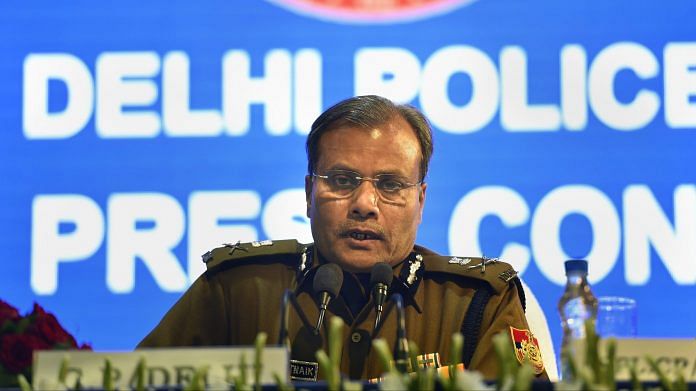New Delhi: Delhi Police commissioner Amulya Patnaik retires on 31 January, and the Ministry of Home Affairs is said to be searching for a successor.
Police in Delhi, a union territory, is overseen by the central government. The job of heading Delhi Police is thus seen as a plum posting that allows IPS officers to court the limelight and remain in the thick of things even after retirement.
Little surprise then that many of Patnaik’s predecessors have gone on to hold high-profile assignments after demitting office. Here are some examples.
Also Read: Delhi Police needs a Singham to salvage its pride and reputation
Plum postings for Delhi Police commissioners
Bhim Sain Bassi, whose stint as Delhi Police commissioner began in August 2013, retired on February 2016. Three months later, he was appointed as a member of the Union Public Service Commission (UPSC), a post he still holds.
His predecessor Neeraj Kumar, who served as Delhi Police chief from July 2012 to July 2013, was appointed as a consultant to the anti-corruption unit of the Board of Control for Cricket in India (BCCI) in 2015. He served the unit until May 2018.
Krishan Kant Paul, Delhi Police commissioner from February 2004 to July 2007, went on to serve as governor of four states — Meghalaya, Nagaland, Mizoram and Uttarakhand.
Paul was appointed Meghalaya governor in July 2013 and served in the post until January 2015. During his stint, he took additional charge as Nagaland governor in July 2014 and Mizoram in September 2014. After Paul’s tenure as Meghalaya governor ended, he took charge in Uttarakhand. He served in this role from January 2015 to August 2018.
Governorships galore
But this is not a recent trend. Ved Marwah, who served as Delhi Police commissioner from 1985 to 1988, went on to become the governor of three states after his retirement — Manipur from December 1999 to June 2003, Mizoram from December 2000 to May 2001 and Jharkhand from June 2003 to December 2004.
Delhi Police commissioner from 1995 to 1997, Nikhil Kumar subsequently served as governor of two states — Nagaland and Kerala.
Also Read: ‘Come with statements, footage, picture’ — Delhi Police wants information on JNU violence
Controversial legacy
A 1985-batch officer of the AGMUT cadre, Patnaik took charge as Delhi Police commissioner in January 2017. He leaves behind a controversial legacy, with his tenure riddled with controversies over the last few weeks.
The Delhi Police’s conduct during the anti-Citizenship Amendment Act protests came into question amid reports that they entered the Jamia Millia Islamia campus on 15 December 2019 and attacked students.
The force courted more ignominy a few days later when they failed to rein in a masked mob’s attack on the Jawaharlal Nehru University campus on 5 January.
Delhi Police has also been criticised for its allegedly lax investigation into the matter as there have been no arrests in the case even though some suspects have been identified.
Even Patnaik’s predecessor also courted much controversy, although after demitting office.
Alok Kumar Verma served as Delhi Police commissioner from February 2016 to January 2017. Verma, a 1975-batch IPS officer of the AGMUT cadre, was promoted as CBI director just 11 months into his tenure as Delhi Police chief.
His appointment as CBI chief was cleared by a three-member selection panel headed by Prime Minister Narendra Modi and comprising former Chief Justice of India J.S. Khehar and leader of the opposition Mallikarjun Kharge. Of the three members, Kharge was against Verma’s appointment as CBI director, saying he lacked experience.
He was appointed as CBI director just months before his retirement. The posting meant an extension as the CBI director is supposed to have a fixed two-year term.
Verma had a rocky tenure as CBI chief over an alleged power struggle with his deputy, CBI special director Rakesh Asthana, which set the stage for one of the biggest controversies in India’s police framework.
In the unprecedented face-off, the two most senior officers of the CBI accused each other of corruption.
Both were subsequently removed from their positions, with Verma posted as director-general of Fire Services, Civil Defence & Home Guards under the Union Home Ministry days before his retirement. Verma refused to take up the role and resigned.
Asthana, a 1984-batch Gujarat-cadre officer who is currently posted as director in the Bureau of Civil Aviation and Security (BCAS), is said to be among the frontrunners to succeed Patnaik as Delhi Police chief.
‘One should not run after such jobs’
The idea of post-retirement postings draws a mixed response among IPS veterans.
Retired IPS officer N.R. Wasan, former NIA special director and director-general of the the Bureau of Police Research and Development, said he hadn’t gone “into any government building since the day I retired”.
“There may be certain posts that are suited to police officers, such as being members of the UPSC… In such cases, a post-retirement government posting is justified,” he added.
“However, one should not run after such jobs and it should certainly not be a favour or a post-retirement reward. You have done your bit (as officers) and should be satisfied with that.”
Former Delhi Police commissioner Neeraj Kumar said the role was an important one and put incumbents in the limelight.
“The post of Delhi Police commissioner is one of the most important and prestigious police assignments. At the same time, it is also one of the most challenging posts,” he added.
“This is because Delhi is the capital of India where the attention of the media and people is the most, not just in India, but internationally… It is also the largest police force of the country, with more than 85,000 officers.”
“If you are Delhi Police commissioner, then you are certainly on the minds of people in the central government for various other assignments, compared to others,” he said. “We are in the limelight.”
Also Read: Controversial ex-CBI officer Rakesh Asthana is top contender for Delhi Police chief post




A speculative, gossip, article.